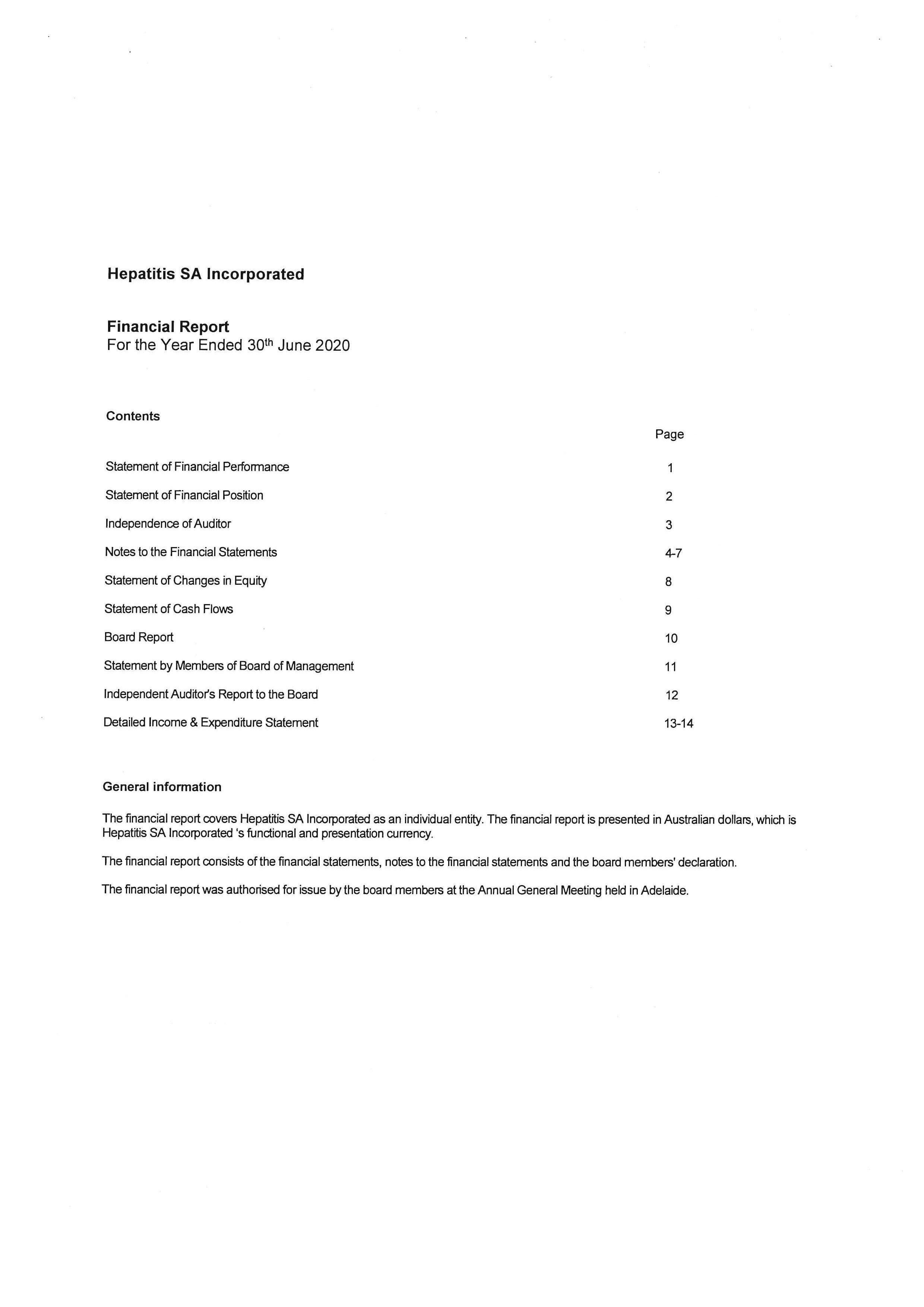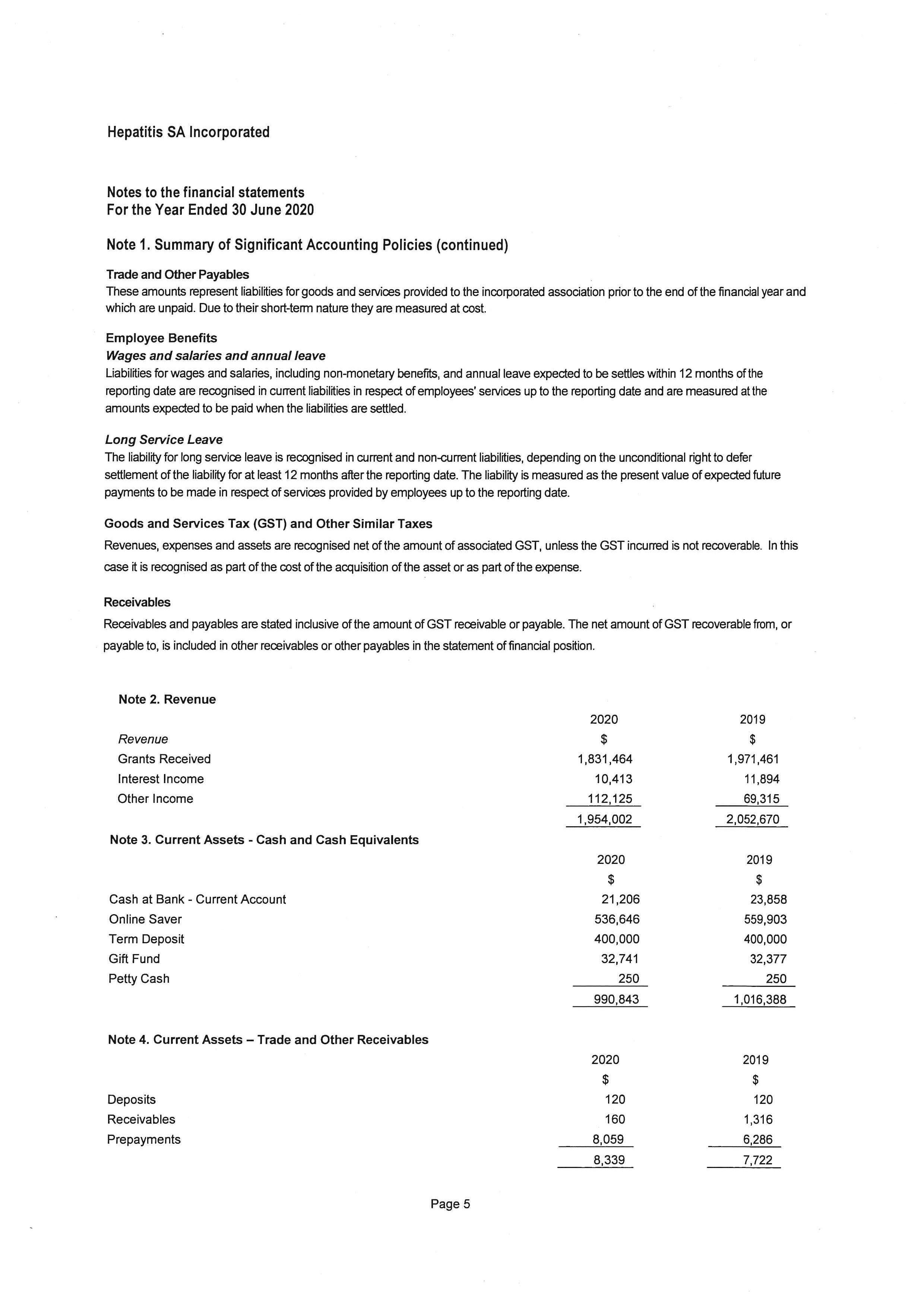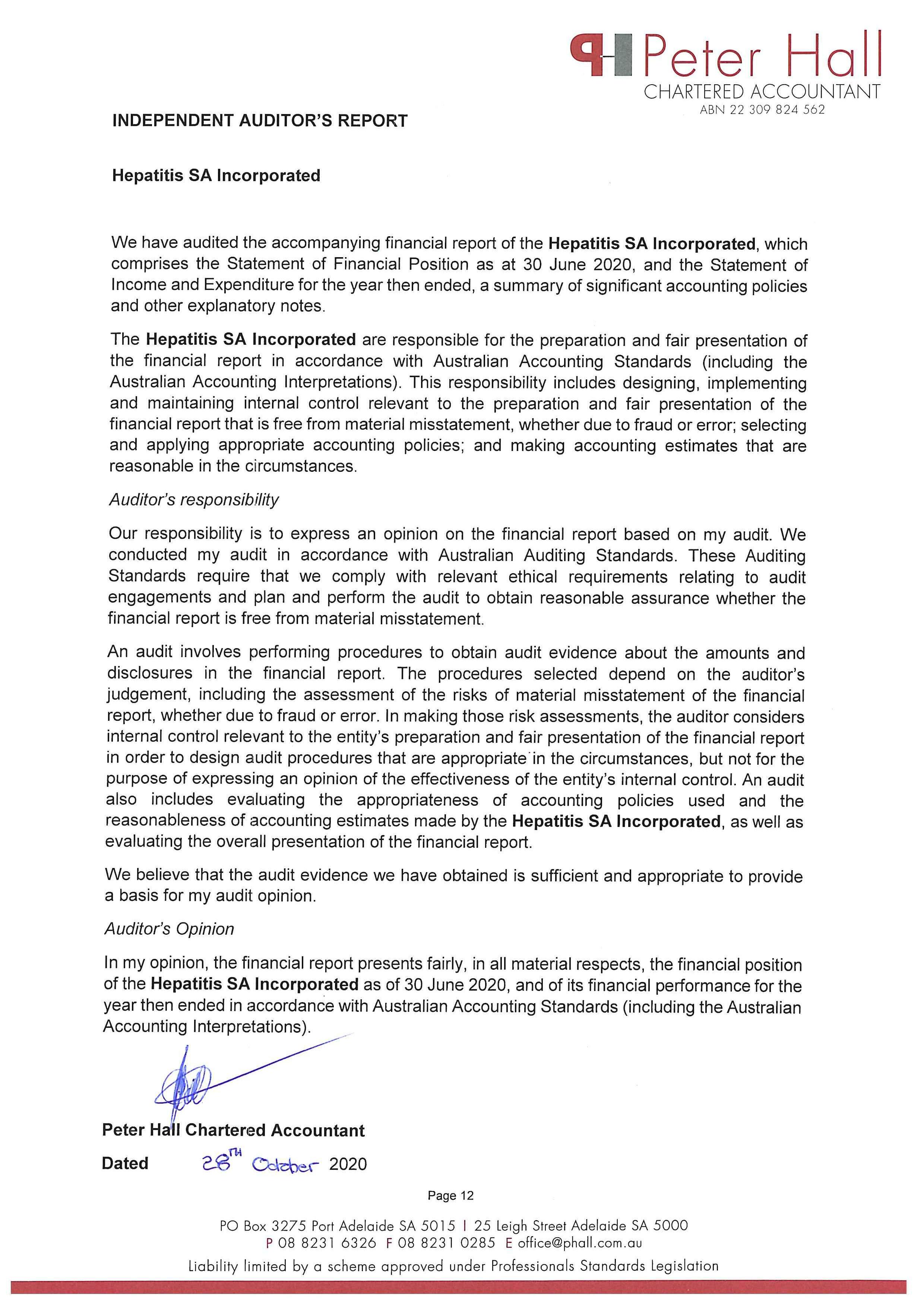
Cover uses elements of a design by new7ducks/Freepik


Cover uses elements of a design by new7ducks/Freepik
The first 8 months of the 2019-2020 financial year were business as usual for the Hepatitis SA Board, monitoring finances and other compliance matters as well as developing the new Hepatitis SA Strategic Plan 2020-2025, which was approved in October 2019. This Strategic Plan mirrors the current National Hepatitis B and Hepatitis C Strategies, and articulates how Hepatitis SA will contribute to the goals and targets of the National Strategies over the next 5 years.
Hepatitis C is a liver disease caused by the blood-borne hepatitis C virus Over time, it can lead to serious liver disease including liver failure and liver cancer
An estimated 170,000 Australians live with hepatitis C.
1 in 5 people with hepatitis C don t know they have it.
You may have been exposed to the virus and not realise it. Exposure can happen through:

Ÿ sharing injecting equipment unsterile tattooing
Ÿ home body piercing or body ar t medical, dental or cosmetic procedures with unsterile equipment blood transfusions before 1990 or

Ÿ any situation where open cuts or wounds might have been exposed to another person’s blood
If you don t know your status and don t know if you might have been at risk, consider taking a test. Start by talking to your doctor
All this changed in March 2020, as the COVID-19 pandemic increasingly impacted Australia, and the CEO and senior staff undertook service planning in light of what was known about the virus at this time. By Monday 23 March, most staff were working from home with a skeleton staff at the office to operate our Clean Needle Program service at Hackney Rd, transfer Helpline calls and manage IT and administrative functions.
For more information on hepatitis C tests, why they're done and what the results mean visit our Hepatitis C Testing page
The Education Team quickly pivoted to promoting and providing online education sessions to health and community workforces across South Australia, being pleasantly surprised by their success in making
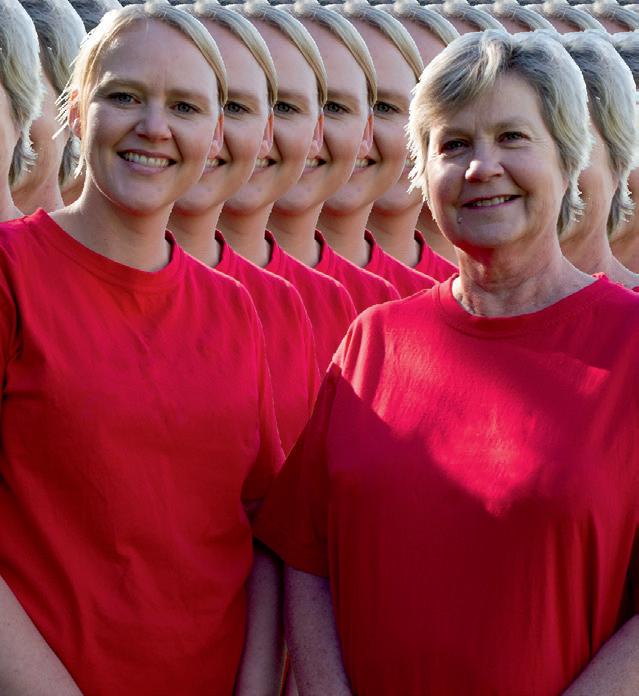
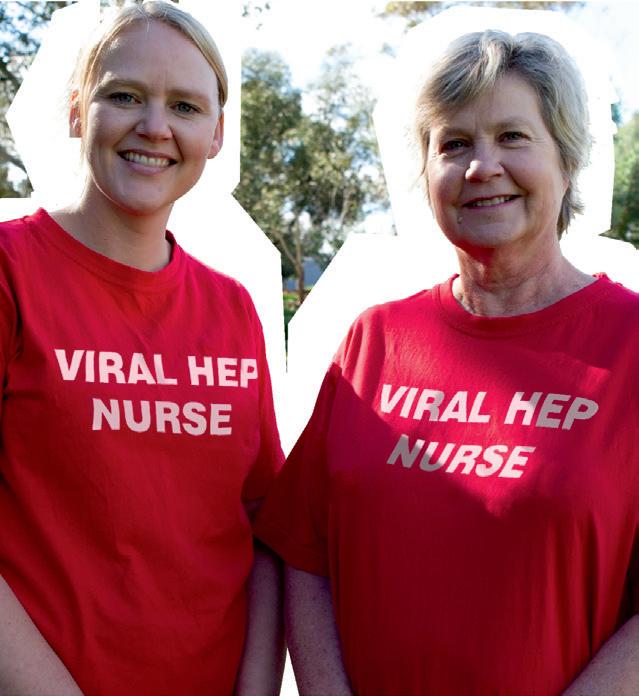

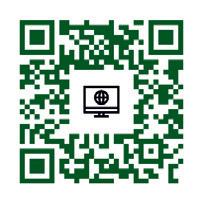

this work. The day-to-day work of the Information and Resources team was perhaps least impacted by the need to work from home, as the majority of their work is computer based, and most of them already had home offices set up. Like the rest of the world, we all adapted to zoom and Microsoft team meetings, Slack and other online technologies. During the transition to remote working, all staff particularly appreciated the hard work of our Information and Communications Technology Support Officer, Bryan Soh Lim, and our Administration Officer, Kam Richter.
risk management plan at their first zoom Board meeting in mid June.
In mid April 2020, we were also informed of the closure of Drug Arm due to loss of funding from the Adelaide Primary Health Network, which meant that our CNP peer service at this site also had to shut down. Apart from this site, all CNP peer services at various sites throughout Adelaide remained operational during COVID-19 restrictions, albeit with new COVIDsafe procedures in place to protect staff and clients.
General Practitioners are now able to prescribe and manage the treatment of hepatitis C using direct-acting antivirals (DAAs) in consultation with a gastroenterologist, hepatologist or infectious diseases physician experienced in the treatment of chronic hepatitis C infection.
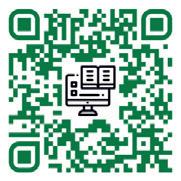
Skilled and experienced clinicians may initiate hepatitis C treatment using DAAs without consultation with a specialist.
Other Hepatitis SA services which involved face-toface interactions ceased at this time—including support groups, volunteer services, outreach hepatitis C treatment peer education and support engagement at host sites and the viral hepatitis screening clinics— though Chen Bin, our viral hepatitis nurse, did manage to organise an HBV vaccination clinic (with COVID safe planning in place) for members of the Chinese community to get their final dose at the end of June.
The Board discussed Hepatitis SA’s COVID-19 response at the early April meeting and reviewed the comprehensive COVID-19
I would like to congratulate all Hepatitis SA staff and volunteers on their adaptability and good humour during this very challenging year. I would also like to acknowledge and thank two long term staff members, Michelle Spudic and Kylie Hull, who left in early 2020 to pursue other opportunities. Thanks also to Maggie McCabe who stepped down from the Board at the 2019 Annual General Meeting (AGM). I would like to welcome Bernie McGinnes and John Beeslee who joined the Board at the November 2019 AGM and extend my thanks to them and the remaining members of the Board for their support during the year.
I would also like to acknowledge and sincerely thank Helen Tyrrell, who resigned in February this year, after 15 years as CEO of Hepatitis Australia. Helen had many successes over the years, but no doubt the most impactful was her leadership of the community response in convincing the Australian government to provide unrestricted access to hepatitis C direct-acting antiviral drugs ( DAAs ) for adults in 2016. Since that time it is estimated that close to 70,000 Australians have been cured, and Australia is one of only a handful of countries on track to eliminate hepatitis C by 2030—though there remains much work still to be done to achieve this.
Finally, I would like to thank all our partner organisations who supported our work this year and our main funding administrators, the staff at the STI & BBV Section at the South Australian Department for Health and Wellbeing, and Drug and Alcohol Services South Australia.
Arieta Papadelos ChairpersonThe Hepatitis SA Clean Needle Program (CNP) Peer Projects employs people who have significant knowledge or experience of injecting drug use as peer educators who are placed at high volume CNP sites across metropolitan Adelaide to provide a range of harm reduction services to people who inject drugs. In addition to reducing barriers to CNP access, peer educators are a source of information for workers at the CNP sites where they are placed.
Fixed site and Sessional CNP
Hepatitis SA CNP peer educators are placed full-time at Noarlunga Health Precinct, Noarlunga; Wonggangga Turtpandi Aboriginal Health Service, Port Adelaide and DASSA Northern Services, Elizabeth. In the first half of the year Anglicare Elizabeth Mission was staffed by CNP peer educators full-time but low client numbers at Anglicare and very high client numbers at DASSA Northern prompted a switch. The full-time CNP peer service transitioned from Anglicare to DASSA Northern, enabling increased access to a peer CNP service for people in the northern suburb.
CNP peer educators also provided part-time sessional services at Nunkuwarrin Yunt; Drug Arm, Warradale
(until service closure in March); Uniting Communities Adelaide and Uniting Communities Hendon (Kurlana Tampawardli). Kurlana Tampawardli CNP is staffed after hours to enable people to access a CNP peer outside of business hours.
A new initiative commenced in October 2019 with a sessional peer educator placed 2 afternoons per week at West Coast Youth CNP, Port Lincoln. The peer was recruited through the Hepatitis SA Enhanced Peer Education Project, where he had received CNP Peer Training. Additional faceto-face training and support was provided by the CNP Peer Projects Coordinator during the year.
CNP Client Interactions Information is collected during CNP interactions in order to monitor trends and changes in drug use patterns to ensure we are responding to clients’ needs. Throughout 2019–2020:

• 1.4 million new syringes were distributed
• 18,925 client interactions (13,405 or 71% male; 5,520 or 29% female)
• An average of 67 syringes provided per interaction
• For every client accessing the CNP, an average of 2.4 other people
indirectly accessed clean injecting equipment
• Clients identified as Aboriginal and/or Torres Strait Islander in 3,189 interactions (about 17%)
• Most CNP clients (71%) reported using methamphetamine; 12% of clients reported using heroin; 8.5% of clients reported using pharmaceutical drugs; and 7% of clients reported using performance and image enhancing drugs (PIEDs)
• Information/peer education was provided during 3,803 (20%) client interactions
• Intensive support was provided on 577 occasions, about 3% of client interactions
for
The CNP Coordinator and Project Officer provided 22 harm reduction workforce development activities (online and face-to-face) to 115 CNP workers, AOD workers, peer workers, mental health workers, students, nurses and Aboriginal Sexual Health workers. Topics included Vein Care; the CNP Introductory Training; Safer Injecting Overview; CNP Peer Projects Overview and Injecting Equipment; Working with People Who Inject Drugs and
the Take Home Naloxone Pilot. The CNP Project Worker organized 2 SALEN (SA Lived Experience Network) Forums, attended by 52 peer/lived experience workers and volunteers.
In addition to formal workforce training, CNP peer educators at fixed and sessional CNP sites provided CNP training to 42 paid staff, volunteers and placement students at host sites, as well as conducting 5 volunteer inductions/buddy sessions to 3 potential Hepatitis SA CNP Peer Project volunteers.


There were 128 male and 46 female post release prisoners who engaged with the SA Post Release Prisoner Project (112 first visits and 63 return visits) at Noarlunga, DASSA Northern, Port Adelaide and UC Adelaide CNP sites. This is more than three times as many as the previous year (from 51 to 174). Almost all (171) were given free specialised equipment (sterile water ampoules, wheel filters, sterifilts, tourniquets and hirudoid) and 49 were
provided with condoms and lube. Peer educators provided opiate/opioid overdose recognition and response education during 92 SAPRP interactions and amphetamine type stimulant (ATS) toxicity education during 44 interactions.
In December SA commenced a Take Home Naloxone Pilot where people could access the overdose reversal drug, naloxone, for free from participating pharmacies. All CNP sites participated in the THN Pilot, with peer educators providing brief interventions on overdose response and naloxone use before providing vouchers for CNP clients to take to pharmacies to redeem free naloxone. Since the Pilot commenced peer educators have provided over 300 naloxone vouchers to clients. Feedback tells us that lives have already been saved through the administration of naloxone (accessed through the Pilot) in recent overdose situations.
It has been quite a challenging year with Hepatitis SA CNP Peer Projects staff implementing all necessary changes to ensure ongoing safe, socially distanced service delivery for our CNP clients during COVID-19 restrictions.
Thank you to the CNP Peer Projects team: Andrea, Anne, Bernadette, Josh, Justin, Kylie, Margie, Mark B, Mark T, Nikkas, Penni, Phil and Sue.
Carol Holly Coordinator
At the beginning of the year, the education team welcomed back Nicole with open arms, after a 12 month break from Education working in another team within the organisation.
In February 2020, when it was becoming all too clear that our lives would never be the same again, the education team brainstormed ways in which we would be able to continue to provide services while working from home. It was decided that online learning would be the way forward, and we commenced promoting our education sessions via Zoom. While we knew numbers of sessions were going to be down on previous years, this did allow us to continue contact with communities and workforces through the COVID restrictions.
The team provided, 53 viral hepatitis education sessions to 792 community members. Participants of community education sessions predominantly included people affected by alcohol and other drug issues, young people (including those in the juvenile justice system), Aboriginal people, people from culturally and linguistically diverse backgrounds, people affected by mental illness,
people experiencing homelessness, and people in custodial settings.
Despite a number of health expos being postponed or cancelled due to COVID restrictions, educators and Hep C peers attended 8 health expos where 599 people were directly engaged – answering questions to a hepatitis quiz. These included a World Hepatitis Day event, a number of health expos in prisons, as well as the Housing and Health Expo, the Nunga Tag Carnival and a NAIDOC Week Fun Day. Particular highlights of the community education program included:
• Securing regular ongoing group education sessions at both Yatala Labour Prison and the
Adelaide Remand Centre. Historically, these two sites have been more difficult to access. This now means Hepatitis SA provides education across all prison sites in South Australia.
• The World Hepatitis Day event at Colonades Shopping Centre was a huge success. Two educators attended the shopping centre on World Hepatitis Day, 28 July 2019, to raise awareness of viral hepatitis with the community. The educators engaged the shoppers with a free henna artist and a quiz raffle. There were 65 community members who entered the quiz raffle over the 3 hours. In one particular interaction a

shopper told us they were going to get a tattoo at a mate’s place the night before, and that the mate had stated he had ‘sterilised the tattoo gun in the dishwasher, so it was all good’. The shopper’s partner had strongly advised him not to go, a very wise idea. This anecdote gave the educators an excellent opportunity to explain transmission risks.
This year the education team also delivered 135 viral hepatitis workforce development sessions to 1,557 participants across a wide variety of workforces. 18 of these sessions were delivered via Zoom. Some of these workforces /sectors included Clean Needle Program staff, Pharmacy sector, Serco staff, Northern Adelaide Local Health Network Mental Health Services, SA Forensic Mental Health Services, SA Mental Health Rehabilitation Services, workers within the beauty industry, Environmental Health Officers and Immunisation Officers at local councils, and nursing and allied health staff at metropolitan hospitals, regional hospitals, and community and Aboriginal health centres. Ongoing work with other workforces included South Australia Police, Department for Correctional Services, and the Metropolitan Fire Service.
Particular workforce highlights included:
• Contacts made with workforces who have higher employment levels of culturally and linguistically diverse community members resulted in a total of 11 sessions provided to 87 participants.
• 9 sessions were provided to 183 students studying a variety of courses through vocational providers including the Pharmacy Guild of Australia, Flinders University Department of Paramedic and Social Health Sciences, University of Adelaide Discipline of Nursing, University of Adelaide Health Promotion Students, Shine SA Sexual Health Course, TIME Education and Training Sterilisation Course and TAFE Whyalla.
Continuing engagement during COVID COVID-19 restrictions meant all visits to South Australian prisons were postponed
indefinitely, so again the team brainstormed ways to maintain engagement with prisoners during this time. We designed paper-based activities which could be handed out to prisoners, including crosswords, find-awords and quizzes, all with a hepatitis theme. Each site received positive responses from prisoners.
The uptake of the Zoom sessions was significantly higher for our workforce education sessions, compared to our community education activities, with many organisations booking in sessions for their staff who were also working from home. Adapting to the new way of service delivery was a challenge to begin with, but as always, the educators got on with it, and we were pleased with our success.
•
Lastly, I want to say a massive thank you and congratulations to my fellow educators, for again going above and beyond in their knowledge growth, session delivery and particularly in their support of each other. It is a joy to work with you all every day.
Jenny Grant CoordinatorWhen COVID-19 started impacting Australia, the Information and Resources (IR) team was best placed to test out remote working at Hepatitis SA to identify any issues and possible solutions, before it was implemented for the whole organisation, as most of our work is done digitally and on computers. Due to the nature of our work, the IR team was able to respond to COVID-19 restrictions with little impact on workflow and productivity.
In 2019–20, Hepatitis SA distributed 52,561 resource items with an estimated 42,100 distributed to the community either directly or indirectly. There were 40 titles in languages other than English and 2,349 of these items were distributed to the relevant communities.
Almost a quarter of the resources distributed were hepatitis C specific information and about one in seven (15%) were hepatitis B specific.
The IR team produces a regularly updated GP information pack provided to doctors who contact us or attend training sessions supported by our educators.

A total of 127 information packs were provided to GPs. Of these, 76 were to GPs practising in nonmetropolitan areas. We also maintain a database of hepatitis friendly GPs that may be filtered by metropolitan/rural, hepatitis B/hepatitis C and suburbs. A total of 611 workforce information packs were distributed to non-clinical workforce. Of these, 82 went to rural workers.
The IR team also provides information services to our workforce partners, and this year we contributed to the EC Australia GP project, which included building the database for recording training sessions, data entry, adapting resources and posters for the project, and providing resources for adapting the EC training toolkit for a South Australian audience.
Other services provided to workforces included responding to a variety of requests, such as information in Tagalog from a viral hepatitis nurse, resources in Dari for a TAFE teacher, a video presentation which is can be uploaded and run on a school’s resource platform, and ‘liver friendly’ recipes for publication in the Adelaide Women’s Prison newsletter.
Four regular mail-outs were completed in 2019–20, distributing close to 17,800 physical and digital resource items. Physical mailouts reach estimated 556 organisations, 176 individuals including 160 community members.
In this financial year, 12 e-alerts were sent out. They included feedback on the draft Hepatitis SA strategic plan, training information for health workers as well as COVID-19 messages.
The number of recipients for electronic alerts fluctuates as people move off and new people sign on; by the end of the year, our e-alerts went out to 316 organisations, 66 community members and 565 individuals on our general alerts list.
While an e-alert may seem an impersonal form of contact, for many individuals, that regular communication establishes a link and they recognise Hepatitis SA – and the sender – as a friend. This is evidenced by many emails we receive over the years as people write to tell us they are cured and no longer need to stay on the list, or sadly, their loved one has died, or even just to reply to our end of year greetings. Here’s one received in this year: “You have always been there, through the hard time and the good... although I’m
cured of Hep C through a course of Harvoni 3yrs ago, I will always be thankful and appreciate the support and help given by Hepatitis SA. I wish all staff and support people, including you ... very Happy and Prosperous Christmas and New Year.”
New resources produced this year included pre and posttest information sheets for hepatitis B and C screening in English, Chinese and Vietnamese. With the help of a student on placement from Curtin University, we also published two resources in Urdu; Hep C: What’s That? and Hep C, Pregnancy and Babies. A Vietnamese translation of our popular pamphlet Hep C Get Cured was also published.
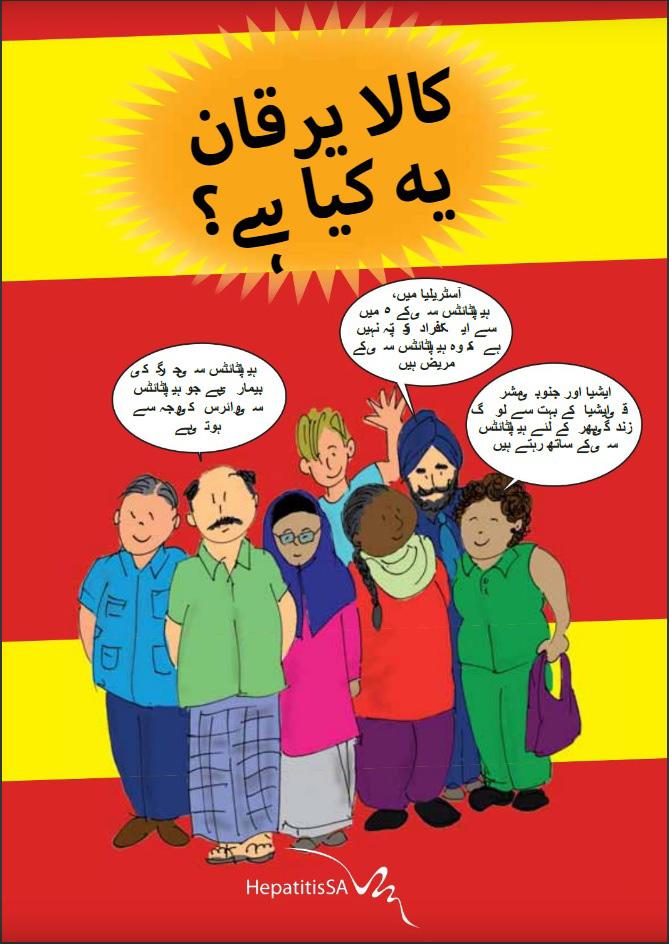
Five issues of the Hepatitis SA Community News were published in this financial year. This included one carried over into early July, from the previous financial year. The magazine may
be viewed at hepsa.asn.au/ magazine. Over 3,400 copies of the printed magazine were distributed in this financial year.
Besides putting most of our print publications online via the issuu platform (issuu. com/hepccsa), Hepatitis SA publishes online via our website (hepatitissa.asn.au), our hepSAY blog (hepsa. asn.au/blog), facebook (facebook.com/hepatitissa), twitter (twitter.com/hep_sa) and as resources become available occasionally, on SoundCloud and YouTube.
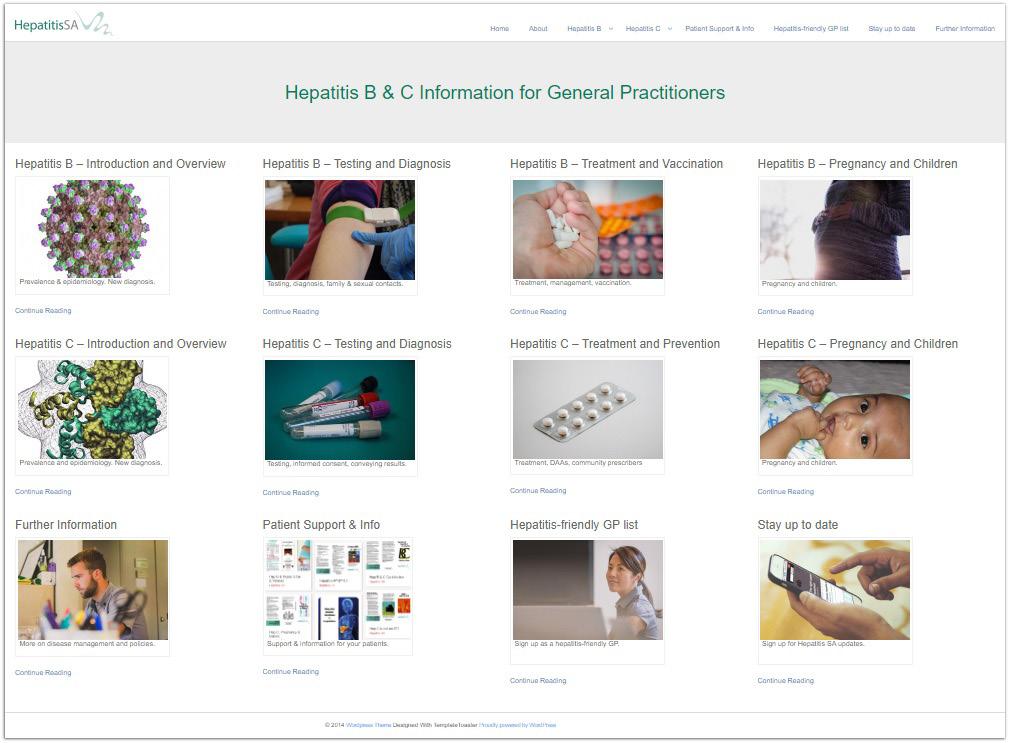
Visitors to our website continue to increase with 30% more visitors in 2019–20, compared to the previous year. While our Facebook and Twitter reach saw the usual dip around the end and start of the year, there were significant upticks in engagement around March and April at the start of the pandemic, indicating the community looking for information. We increased
online activities significantly since COVID-19, especially at the beginning when it was necessary to communicate our situation to the community, and when people were looking for more information regarding the new virus and how it might affect them. This we met by presenting information not only on hepatitis but on coronavirus as well, and where possible how that related to hepatitis and hepatitis-related services.
Selected articles from the Community News were published online via our blog, some before the print copy is available. In all, nine new posts were published on the hepSAY blog, 27 new articles on the website, 250 posts on Facebook and 289 messages on Twitter. We currently have 233 followers on Facebook and just over 1,090 on Twitter.
The Information and Resources team maintains an online GP information portal
(hepsa.asn.au/gp) which forms a key part of the GP information pack provided to general practitioners.

The Hepatitis SA Library continues to play an important role as the only viral hepatitis-focus library in Australia. Our library mailing list includes workers in the sector from other states and territories. The library currently has around 2,140 titles. To ensure relevance, particularly with regard to treatment information, older or superseded resources are weeded out regularly. Search requests vary in nature from patient/client orientated resources to peer-reviewed academic articles.
In 2019–20, our librarian responded to 12 search requests on topics including PPE, cleaning and specific transmission risks in a variety of occupational settings, peer engagement and outcomes in harm reduction
as well as issues specific to access to treatment for migrant populations.
The IR team’s main community engagement activities were through the World Hepatitis Day (WHD) campaign and the Chinese Community Information and Support Project.
There were two major community events: the Adelaide Pakistani Women’s Association dinner, a WHD event, and the Chinese Cultural Concert in September 2019. Information and resources were distributed at both events, a hepatitis C treatment peer shared her story at the dinner event, and an animated promotional video was presented at the concert.
A major part of the Chinese community project was the Infoline and WeChat service, together with supporting
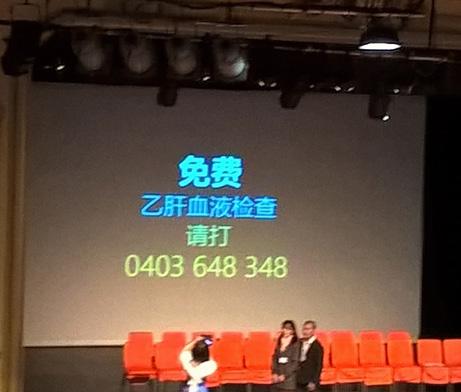
the Hepatitis SA viral hepatitis nurse in setting up viral hepatitis testing and vaccination clinics. Two information sessions were held, reaching 91 participants. The information and support service received 564 contacts, mostly requests for information on accessing services, testing, vaccination and treatment. Four screening clinics were held, with 39 people tested for hepatitis B and C, and 69 vaccinations were given. Others were assisted in getting testing and HBV vaccinations via a GP and immunisation services in the community.
In conclusion, the IR Team is grateful that we were able to continue our work providing information and related support to the community, despite the pandemic. We would like to thank our colleagues who generously gave their time to help put together our mail out while the IR team worked off-site, especially Fred, Carol and Kam for overseeing onsite preparation and the post office ‘drop off’. We would also like to thank our volunteers, Sandy, Apoorva and Siddhartha whom we ‘sent home’ in March and hope to see again in the future.
Hepatitis SA delivers confidential, free call helpline services to all South Australian residents and to other settings where local information is not available. The service also offers the opportunity to access information and support in-person. Referrals to other services are regularly provided where appropriate. The line is staffed by Hepatitis SA workers and one experienced volunteer, Debra. We thank Debra for her long commitment to providing a quality service to the affected community over the past 14 ½ years and look forward to her return to the office post COVID-19 office restrictions.
The Helpline & Support Service received a total of 270 contacts; 207 through the Helpline, 50 via email and 12 in-person. A new web chat
service also commenced in late June 2020 (PureChat) which received 1 contact. First time clients accounted for 55% of the total contacts. Most people (228) were seeking information, 36 emotional support and 6 were discrimination related enquiries. The great majority (228) resided in the metropolitan area, 30 from regional SA, two interstate, five overseas and five from an unknown location.

Workers disclosed their lived experience of viral hepatitis to 62 clients. Referrals were provided to 118 people which included the Adelaide Dental Hospital, anti-discrimination organisations, hep C friendly GPs, Clean Needle Program sites and viral hepatitis nurses, amongst others.
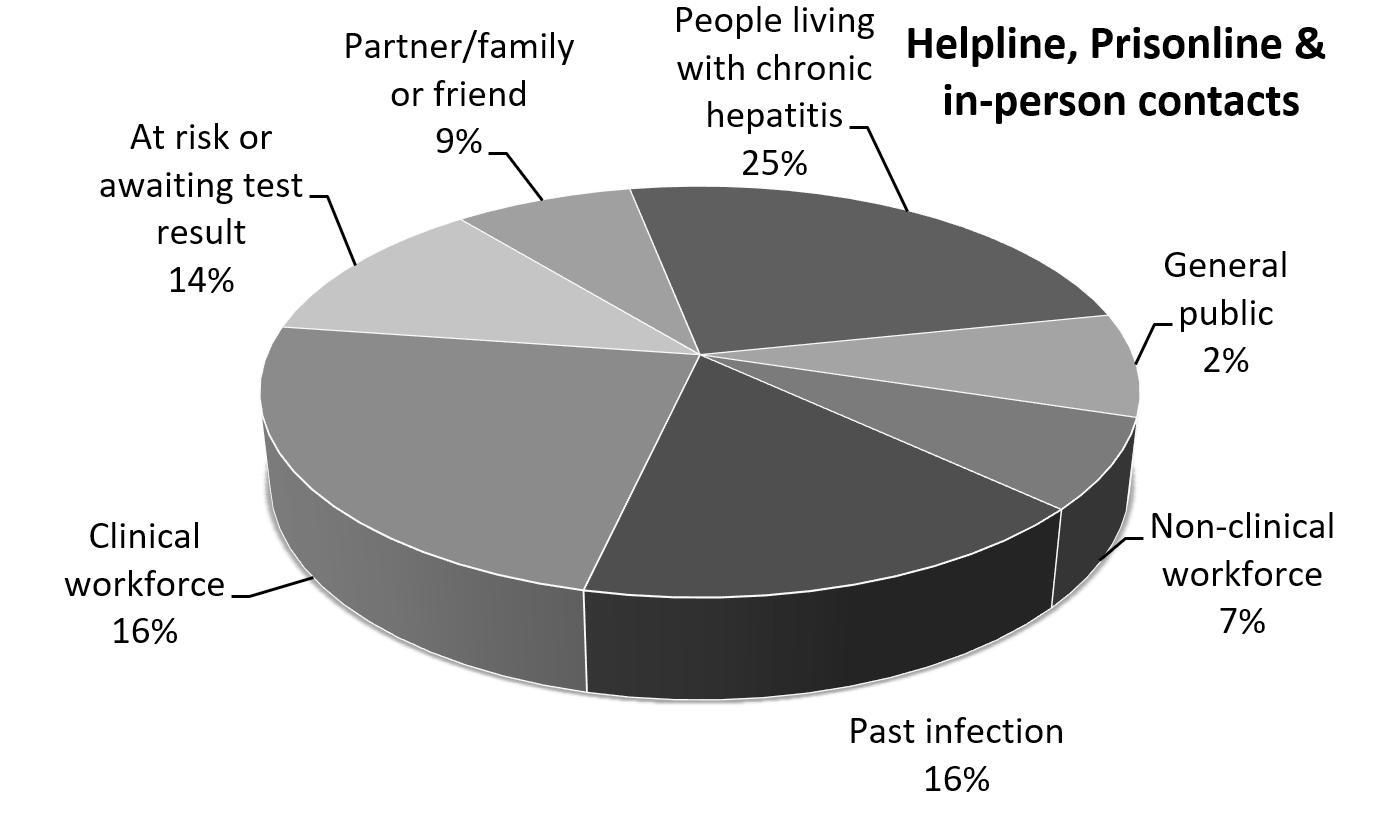
Hepatitis SA provides a free call information & support service to all SA prisoners.
Seventeen calls were received over the year with 13 (76%) making contact for the first time. Most callers were in the metropolitan area (2 Remand Centre, 2 Yatala and 8 Adelaide Women’s Prison) and the remaining five were from Mt Gambier prison. Calls from female prisoners were increased this year due to awareness activities conducted by Hepatitis SA in June.
Two support groups have run every 8 weeks at Port Adelaide and at Hepatitis SA in Hackney. Since 2016, with the availability of the new DAAs, and the reduced need for support to undertake and complete hepatitis C treatment, attendance at the groups has continued to decline. All in-person support groups were suspended in late March due to COVID-19. Although the opportunity to meet on line was offered to existing clients for whom we had contact details, this was not considered a suitable option by them. Most of our support group participants are of older age and many have low computer literacy, no computer access or limited access to the internet. Further options for in-person support will be explored in the next financial year.
“That’s great, you have been very helpful.”
“Thank you so much. I felt like I was at the edge of a cliff. I feel so much better now.”
“Thank you, you showed me some light now.”
“You have explained this very well, Thanks.”
“You guys are excellent by the way, so helpful. Thank you.”
“It is great to talk to someone about all this that has been through it.”
“Only ones who’ve provided anything that makes sense”
“Thanks for caring. It makes a bigger difference than most could understand”
“Thank you. You have put my mind at ease. I was in a real panic.”
“Wanted to call to thank you again, your information & support yesterday was excellent.”

“I’m impressed with this service.”
Deborah Warneke-Arnold Coordinator
Hepatitis C Treatment Peer Educators provided information, support and referrals to a total of 565 individuals from July 2019 to early March 2020, when COVID-19 restrictions meant all face to face activities had to cease. During the pre COVID-19 period, the peer educators provided an outreach service mainly engaging people who were attending alcohol and other drugs services, mental health and homelessness services, clean needle program sites and community corrections. At these locations, the peer educators often worked with the community viral hepatitis nurses to link clients to blood borne virus testing and treatment services, including fibroscans.
Additionally, the peer educa tors were involved in a num ber of activities in SA prisons throughout the year prior to COVID-19 restrictions, including:
• Engaging with 164 people at prison Liver Health Days that took place at Mobilong and Port Lincoln prisons, ensuring all in attendance were aware of hepatitis C transmission risks, testing and treatment options, as well as hepatitis B testing, vaccination and monitoring. Participants took part in a quiz and 40 participants were referred to the SA Prison Health and the community viral hepatitis nurses for testing and/or treatment, as required;
• Providing information and support, one to one, with 12 people at the Adelaide Pre-release Centre;
• Attending education sessions with the Hepatitis SA Education team to provide their lived experience to 235 prisoners at 4 other prisons across the state;
• Participating in a Smoke Free Health Expo at Cadell Training Centre with 103 participants and NAIDOC Week at Yatala Labour Prison, engaging with 57 prisoners during the BBQ celebration there.
The peer educators were also involved in awareness raising activities during the year, kicking off with World Hepatitis Day on the 28 July, which included events at 5 locations - Gawler Aboriginal Health, Pt Adelaide Community Corrections, Encounter Church in Gawler, Kurlana Tampawardli in Hendon and Anglicare Elizabeth Mission. At these events, the peer educators engaged with 180 people and 43 people had Liver Health ssessments, including fibroscans, from a community viral hepatitis nurse in attendance.
I also presented my lived experience of hepatitis C and being cured with the DirectActing Antiviral treatment in 2016 to 96 people who attended an event for the Adelaide Pakistani Women’s Association. Other events at which peer information and support were provided during the year were One Mind at Gawler Health Service during Mental Health Week and the Health and Housing Expo, hosted by Shelter SA, at the Adelaide Town Hall.
 Lisa Carter Coordinator
Lisa Carter Coordinator
Total revenue for Hepatitis SA for 2019-2020 was $1,954,002 This was made up from grant income which was the net result of 12 months recurrent funding for the financial year for the following grants from SA Health – 914,111 for the SA Viral Hepatitis Prevention and Workforce Development Project; $523,551 for the Clean Needle Program Peer Project; $164,708 for the CNP Transitional Sessional Peer Education Project; and approved carryover of $5,176 for the Enhanced Peer Project. Other grant income included a small grant of $3,730 from Hepatitis Australia for a World Hepatitis Day project, and $5,173 from EC Australia for a GP peer training project. Included in grant income from SA Health, was $223,917 Social and Community Services supplementation as a contribution to the costs for the Equal Remuneration Order.
Other income included $62,500 cash boost from the Australian government in response to COVID-19; $10,413 Interest; $15,842 in Recoupments, being mainly cost recovery for the full range of Clean Needle Program equipment distributed in South Australia, Sundry Income totaling $24,880 which included profit on sale of assets, donations and sponsorship.

Total expenditure for the year was $1,946,143.The major expense was the Employee Benefits expense of $1,723,358 comprised of Salaries and Wages of $1,539,969 and On-costs of $183,389.
Other large expenses were Premises Rent and On-costs of $107,356 Office expenses of $58,354 as well as other expenses of $30,370 which were comprised of Program costs of $27,953 and Other staff costs of $2,417.
Motor vehicle expenses were $10,704 Travel and accommodation was $8,608, just under half the cost of last year due to the impact of COVID-19 on staff travel, and the Depreciation and amortisation expense was $7,393.

For the 2019-2020 financial year, Hepatitis SA had a surplus of $7,859 resulting in total equity of $291,309 as at 30 June 2020.
Hepatitis SA would like to thank the STI and BBV Section at the South Australian Department for Health and Wellbeing and Drug and Alcohol Services South Australia for administering Hepatitis SA’s major recurrent funding during the 2019-2020 financial year.
Larkin Treasurer17 18 19 20–23 24 25 26 27 28
